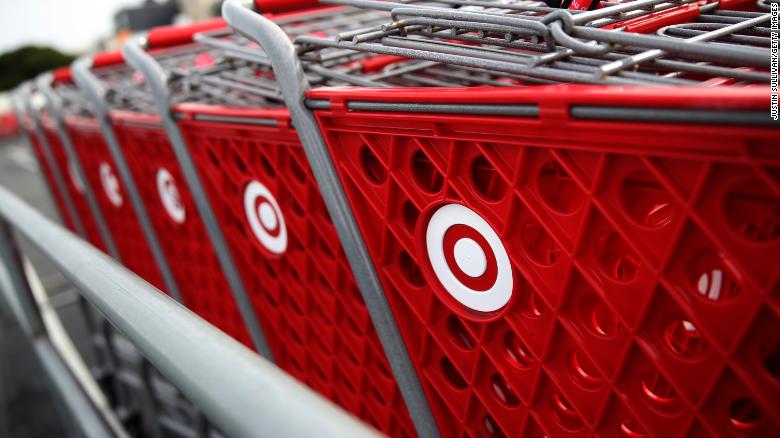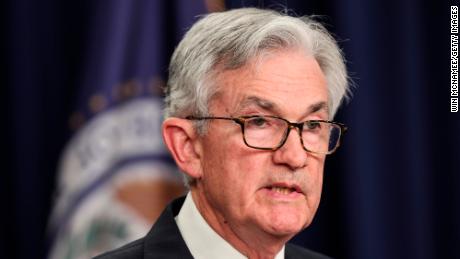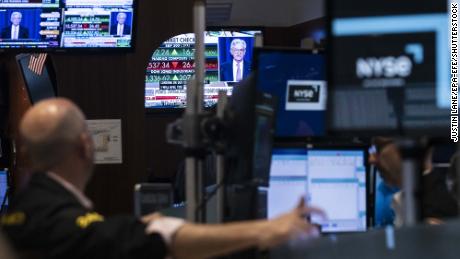By Nicole Goodkind, CNN Business
Updated 5:47 PM ET, Wed May 18, 2022

New York (CNN Business)The old joke goes like this: Two friends are at a resort and one says, "The food here is really terrible." The other replies, "And the portions are so small!" Today, it's investors who dislike the taste of the Federal Reserve's interest rate hikes — but seemingly want more anyway.
Markets have plummeted over the past month as the Federal Reserve telegraphed that it would regularly hike interest rates by half a percentage point for the foreseeable future to combat persistent inflation. On Wednesday, the Dow (INDU) shed more than 1164 points, or 3.6%, its biggest loss since 2020. The broader market lost 4%, putting the S&P 500 (SPX) on the precipice of bear market territory. The Nasdaq Composite lost 4.73%.
Now, investors are asking for more. They're calling for a three-quarter-point rate hike at the conclusion of the Fed's June meeting, despite Fed Chair Jerome Powell's assurances that an increase that high isn't on the table.
Bank of America analysts wrote in a note that they fear there will soon be a wage-price spiral in the US because of risks that "the Fed hikes too little." The current market reaction, they said, suggests that "investors see the Fed as moving too slowly on the inflation fight: a 75 [basis point] hike might have been feared but it appears it would have been preferred."
Nomura Securities has predicted that the central bank will hike the fed funds rate by three-quarters of a point in June and July after the half-point rise in May.

Fed Chair Jerome Powell: We won't hesitate to raise rates to tame inflation
"We recognize Fedspeak has not outright endorsed a 75 basis point hike yet, but in this high inflation regime we believe the nature of Fed forward guidance has changed — it has become more data dependent and nimble," said Rob Subbaraman, Nomura head of global markets research, in a note.
The Fed could hike rates to 5% by the time it ends the current bout of tightening, Deutsche Bank's chief economist said. That would be the highest level since 2006.
Fed-funds futures traders see a 9% likelihood that the Federal Reserve will raise its main policy rate target by three-quarters of a point in June, to between 1.5% and 1.75%, according to the CME FedWatch Tool.
St. Louis Fed president James Bullard has stoked the flames for a potential three-quarter-point hike this year in public speeches and Federal Reserve Bank of Cleveland President Loretta Mester told Japan's The Nikkei that a 0.75 percentage point hike could not be ruled out later this year in an interview Monday.

A screen shows a press conference with Jerome Powell, the Chair of the Federal Reserve of the United States, following news about the Federal Reserve decision to raise interest rates by half a percentage point on the floor of the New York Stock Exchange on May 4, 2022.
So why are markets fighting the Fed chair's assurances that a larger hike won't come in June — and hurting themselves by predicting it will?
"When a Fed official suggests a 50 basis points hike, markets immediately start trying to price in 75 basis point hikes," said Jamie Cox, Managing Partner for Harris Financial Group. "It's madness really."
The Dow has fallen 5,095 points, or 14% in 2022. The S&P 500 has dropped over 18% and the Nasdaq Composite has lost about 28%.
"Powell tried to take the 75 basis point hike off of the table at the last press conference," said David Lebovitz, a global market strategist at J.P. Morgan Asset Management.
But the following week, the Consumer Price Index, a key measure of inflation, shot up 8.3% for the year. The measure was lower than March's 8.5% increase, but higher than the 8.1% increase economists expected.
The Fed has a new plan to avoid recession: Party like it's 1994
The issues between markets and the Fed may have less to do with an eye toward self-flagellation and more to do with a growing mistrust of the institution. The old-time mantra of "don't fight the Fed" has morphed into "don't believe the Fed."
"People start to lose faith in the idea that the Fed really does have its arms around inflation," said Lebovitz. "It's all about getting a grip on what the Fed is going to do and unfortunately, given the lack of clear guidance from them, and an inflation report that surprised to the upside, investors are a little bit uncomfortable."
Even former Fed Chair Ben Bernanke seeded some doubt this week when he broke the unspoken edict amongst former Fed chairs to not speak ill of their successors. The Fed made a mistake in delaying their decision to raise rates, he said during an interview on CNBC's Squawk Box Monday.
"And I think they agree it was a mistake."
No comments:
Post a Comment